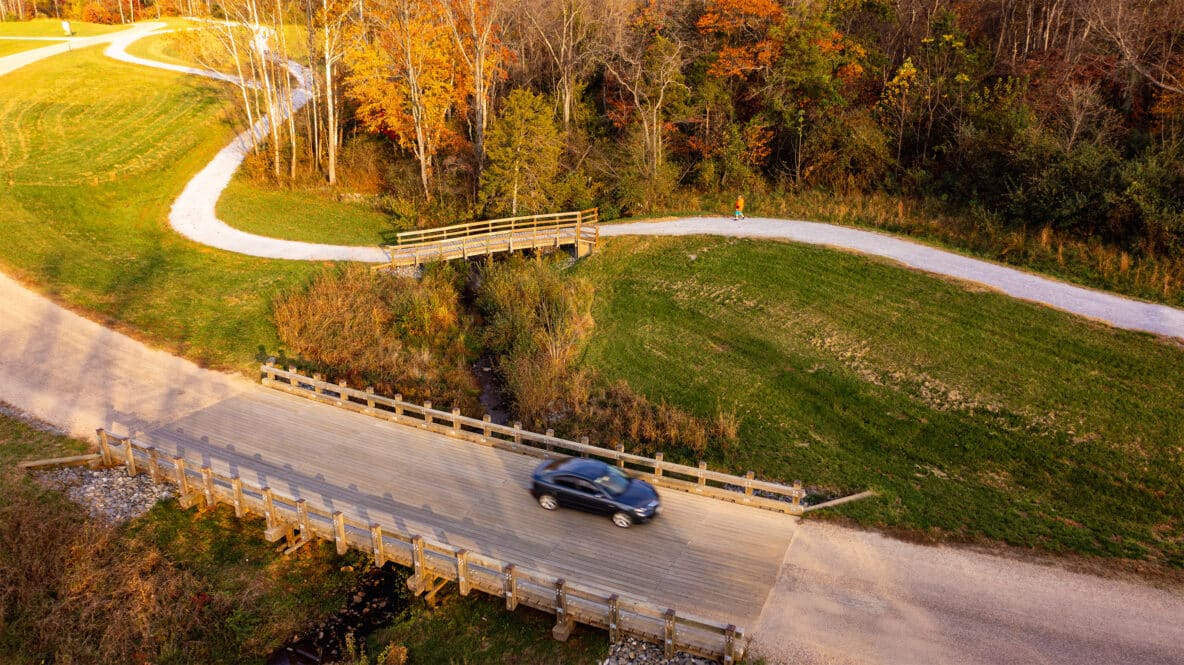York Bridge Concepts’ Contribution to Thomas Jefferson’s Poplar Forest: Building Sustainable Bridges for Community Connection
York Bridge Concepts (YBC) is a leader in custom timber bridge design and construction, known for pioneering sustainable, aesthetically aligned projects that respect natural landscapes. One such significant undertaking was the construction of vehicular and pedestrian bridges for the Poplar Forest community, a historically rich and serene area originally established by Thomas Jefferson as his personal retreat. Poplar Forest today is a community that cherishes its heritage while seeking modern conveniences that support a harmonious lifestyle and environmental preservation.
The project involved creating an HS20-44 vehicular bridge and a 90PSF pedestrian bridge that connect the Poplar Forest community to nearby amenities. This infrastructure not only facilitates access but also embodies the values of sustainability and conservation that are essential to both YBC and the residents of Poplar Forest. This article explores how YBC’s innovative construction methods supported wetland mitigation, provided access, and maintained the natural beauty of the Poplar Forest community.
Project Background: The Poplar Forest Vision & Community Needs
Poplar Forest, initially Thomas Jefferson's private retreat, has grown into a distinctive community that balances historical significance with natural beauty. Jefferson designed his estate to blend into the landscape, with an emphasis on tranquility and respect for nature—a principle that continues to guide development decisions at Poplar Forest.
The bridges were constructed to meet the community’s needs for enhanced accessibility to amenities while respecting the area’s historic and ecological values. These bridges are not just functional structures; they are gateways that encourage residents and visitors alike to engage with their surroundings more fully. Given the region's wetlands and environmentally sensitive areas, YBC faced unique challenges in constructing durable, accessible, and ecologically respectful bridges.
Specifications
Vehicular Bridge
- Length:
- 80’
- Width:
- 25’ (23' 8" clear)
- Height:
- 8’ (from ground)
- Capacity:
- HS20-44
- Use:
- Vehicular
- Construction:
- Deck-Level
- Span Type:
- Repetitive Span
- Span Lengths:
- 16’ 11” | 15’ 8.25” | 19’ 6” | 14’ 3.75” | 15’ 1.5"
- Material:
- CCA/CA-C Treated SYP
- Foundation:
- Timber Abutments
- Stringers:
- SYP Stringers
- Deck System:
- 2” Wear Deck | 4” SYP Subdeck
- Guide Rail:
- Decero™ Classic Design Series
- Crossing:
- Stream
Pedestrian Bridge
- Length:
- 41’ 8"
- Width:
- 8’ 1.25" (7' 5.25" clear)
- Height:
- 7' 5.5’ (from ground)
- Capacity:
- 90PSF
- Use:
- Pedestrian
- Construction:
- Deck-Level
- Span Type:
- Repetitive
- Span Length:
- 10'
- Material:
- CCA/CA-C Treated SYP
- Foundation:
- Timber Abutments
- Stringers:
- SYP Stringers
- Deck System:
- 2” SYP Deck
- Guide Rail:
- Decero™ Classic Wire Mesh Series
- Crossing:
- Stream
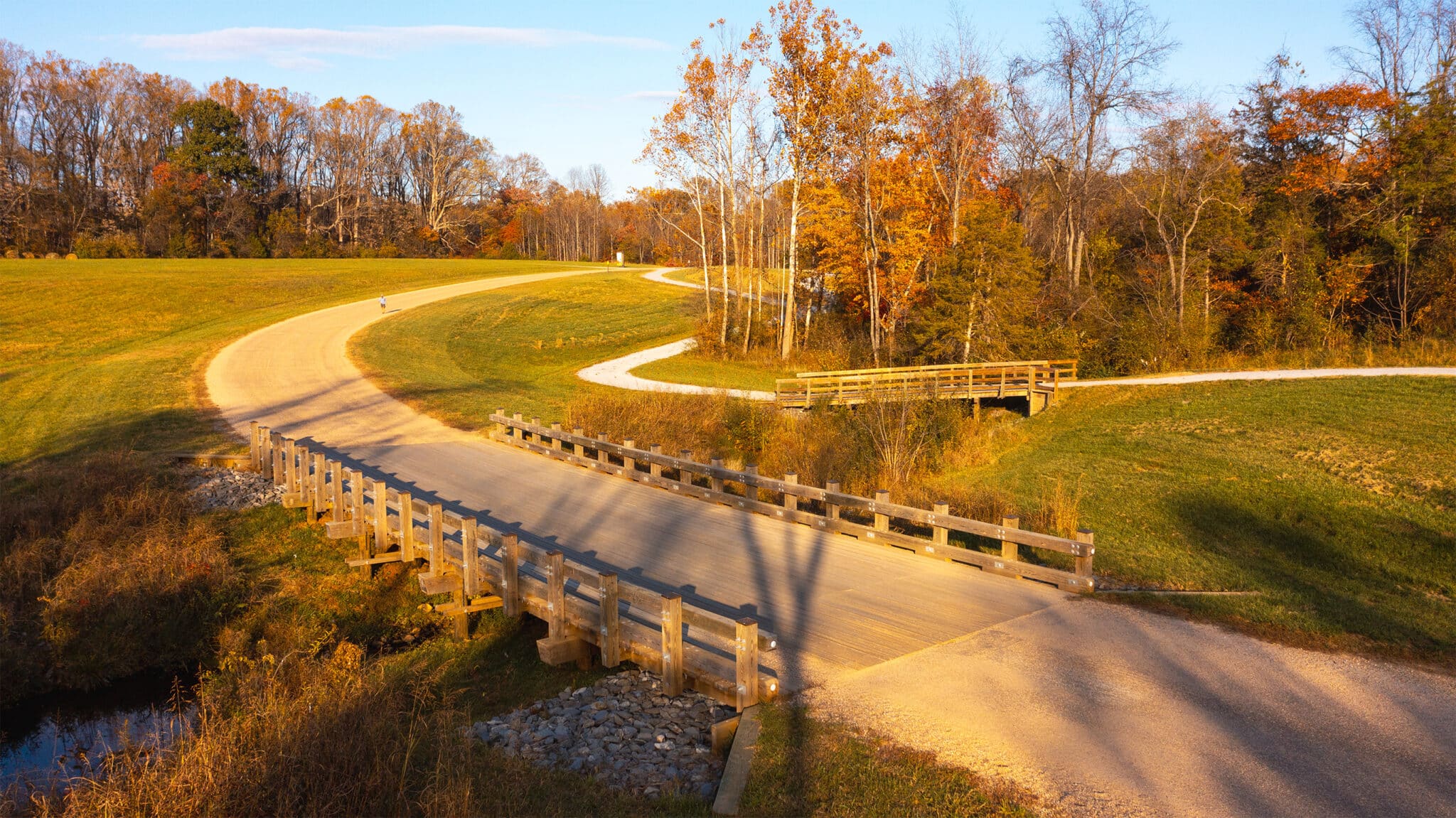
Sustainable Construction Methods Employed by YBC
YBC’s sustainable approach to construction was central to the success of the Poplar Forest bridge project. Known for its dedication to eco-friendly practices, YBC incorporated methods designed to minimize disruption to the local ecosystem, particularly the wetlands.
Key elements of YBC's Sustainable Construction practices include:
Deck-Level Construction
With YBC's Deck-Level approach no excavation was needed and our team was able to hammer-drill piling into place without any heavy equipment disturbing the wetlands, which helped preserve the natural topography and existing plant life around the bridge sites.
On-Site Development
YBC's master craftsman worked on-site to ensure that all of the timber elements came together to reveal a beautiful, finished product. With the curved radius of the bridges to meet up with roads and pathways a pre-fabricated solution would not be able to accomplish this type of precision needed to complete this project within budget and timeline.
Sustainable Timber Sourcing
The wood used in YBC’s bridges is responsibly sourced, ensuring that no unsustainable deforestation practices are involved. Timber bridges provide a naturally resilient option, and YBC’s commitment to sustainable materials aligns with the conservation goals of the Poplar Forest community.
These methods were carefully chosen not only to comply with environmental standards but also to align with YBC’s commitment to preserving natural beauty. Each construction decision was made with the long-term health of the wetlands and local environment in mind, underscoring YBC’s role as a sustainable infrastructure innovator.
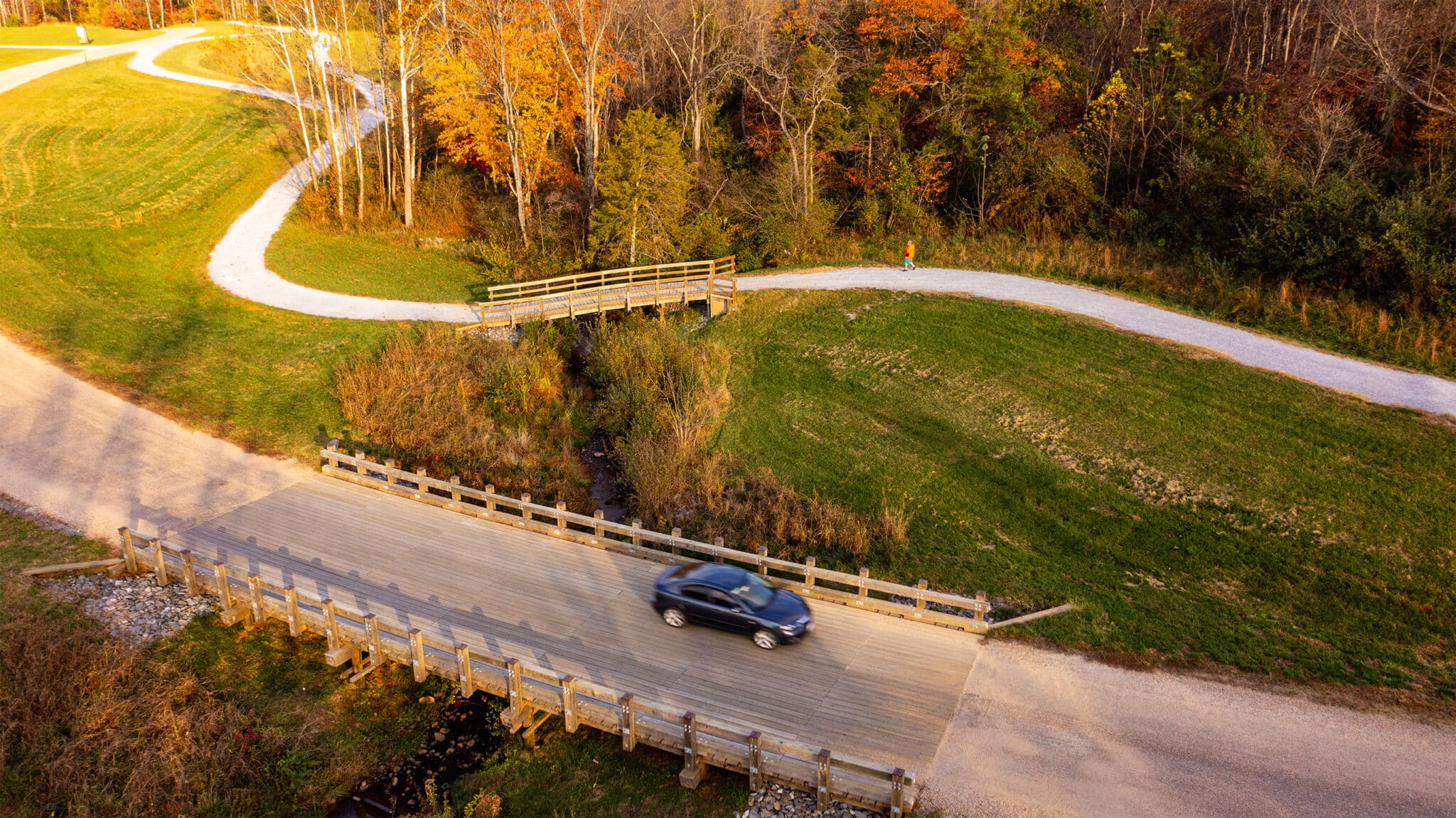
Design & Construction of the HS20-44 Vehicular Bridge
The HS20-44 vehicular bridge constructed by YBC is designed to support significant loads, providing a safe and durable route for vehicles within the Poplar Forest community. Key features of this bridge include:
Load-Bearing Capacity
The bridge meets HS20-44 specifications, allowing it to support the weight of heavy vehicles, ensuring robust access to amenities for residents and visitors. This standard is particularly important for supporting emergency vehicles, delivery trucks, and other essential services.
Natural Integration
From the bridge’s timber materials to its structural design, every aspect was intended to complement Poplar Forest’s landscape. The bridge’s organic aesthetic ensures it blends naturally with its surroundings, reducing visual impact and maintaining the area’s historical ambiance.
Environmentally Sensitive Installation
Special care was taken during construction to avoid disruption to the wetland. Foundation work was minimized, and sediment control measures were implemented to prevent adverse effects on local waterways.
By balancing functionality with a natural aesthetic, the HS20-44 vehicular bridge provides a reliable, sustainable access point that meets modern standards while honoring the historical and environmental significance of Poplar Forest.
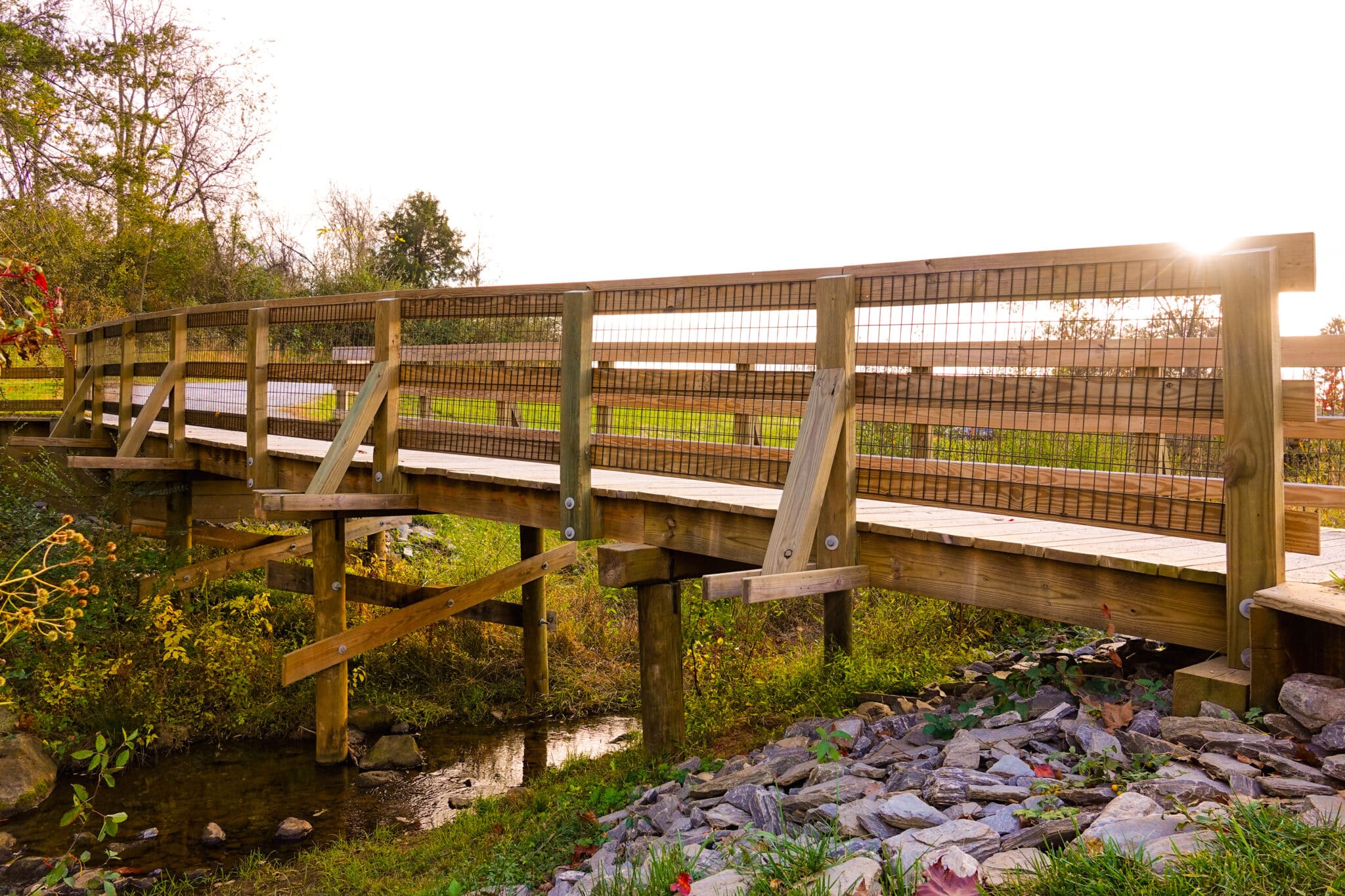
Design & Construction of the 90PSF Pedestrian Bridge
The pedestrian bridge was designed with the same meticulous attention to sustainability and aesthetics, supporting a weight load of 90PSF to ensure safe passage for community members enjoying the scenic surroundings. Key design features include:
Sturdy & Safe for High Foot Traffic
With a load capacity of 90PSF, the pedestrian bridge can accommodate large groups, ensuring that residents and visitors alike can use the bridge safely, whether for leisurely walks or community events.
Scenic and Contextual Design
Crafted from natural timber and designed to align visually with the environment, the pedestrian bridge invites people to engage with the landscape. It reflects the same principles that guided Jefferson’s design of Poplar Forest: natural harmony and minimal intrusion.
Eco-Friendly Construction Techniques
Similar to the vehicular bridge, the pedestrian bridge was constructed with prefabricated components and minimal disturbance to the surrounding land. Erosion control methods were implemented to ensure that local waterways remained unpolluted throughout the construction process.
By designing a pedestrian bridge that respects the area’s aesthetics and environmental needs, YBC has created a structure that serves both as a functional path and as a visual extension of the Poplar Forest landscape.
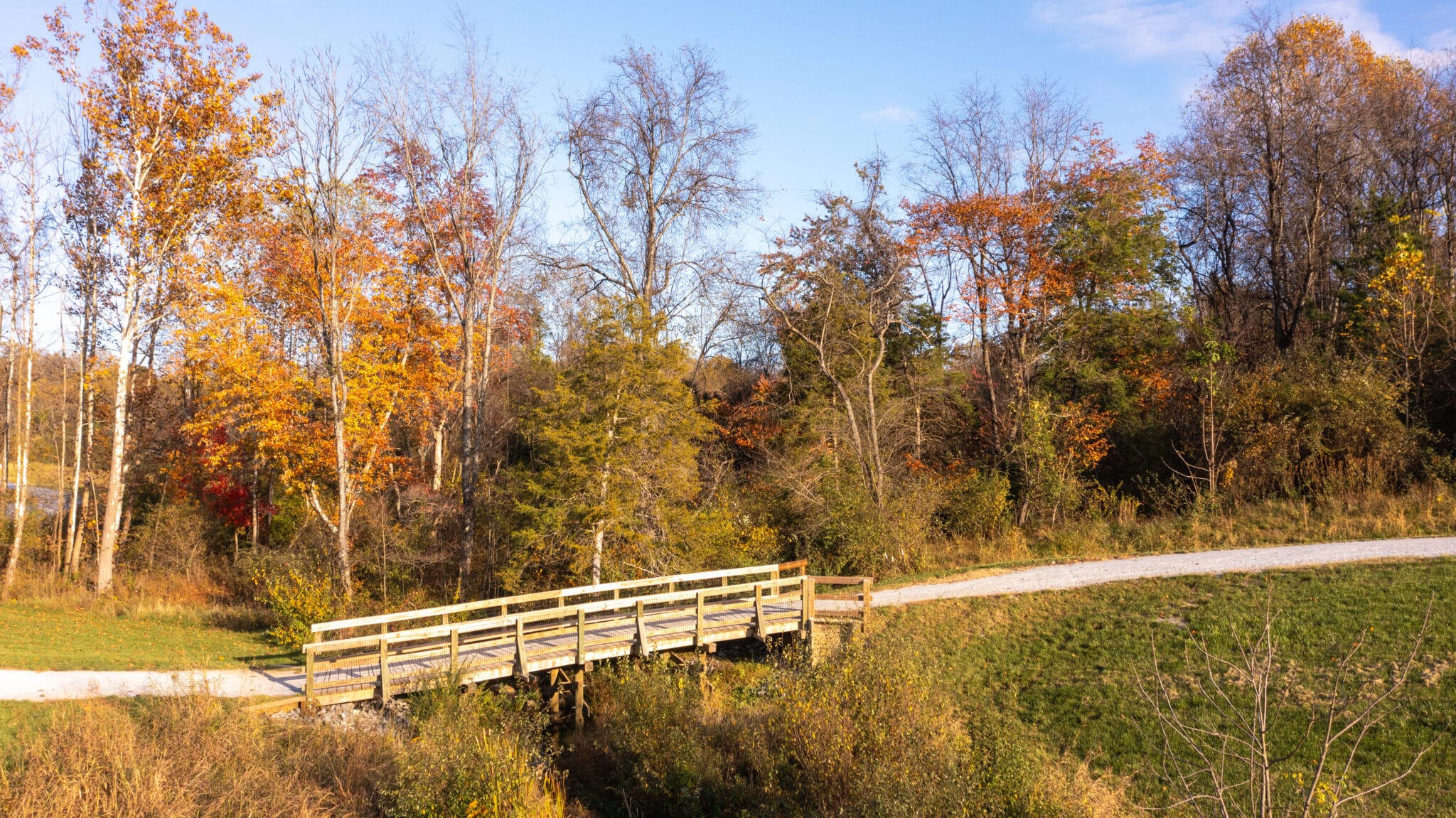
Wetland Mitigation & Integration with Natural Surroundings
Protecting the Poplar Forest wetlands was a primary objective of this project, achieved through a combination of eco-sensitive design choices and sustainable construction practices. YBC’s commitment to wetland mitigation included:
Preserving Existing Flora and Fauna
YBC implemented careful site planning and sustainable construction practices to avoid damaging native plant species and wildlife habitats. By keeping the construction footprint minimal, YBC ensured that the local ecosystem would remain largely undisturbed.
Ecosystem Preservation
Throughout the project, special measures were taken to protect the water quality in nearby streams and wetlands, recognizing that these water sources are essential for maintaining the local ecosystem.
Design Harmony with Natural Environment
Both bridges were designed to complement the surrounding landscape, creating an organic, seamless transition from the natural terrain to the built environment. This approach minimized visual impact and helped preserve the natural ambiance of Poplar Forest.
Through these efforts, YBC not only met the environmental requirements but set a precedent for sustainable infrastructure in ecologically sensitive areas.
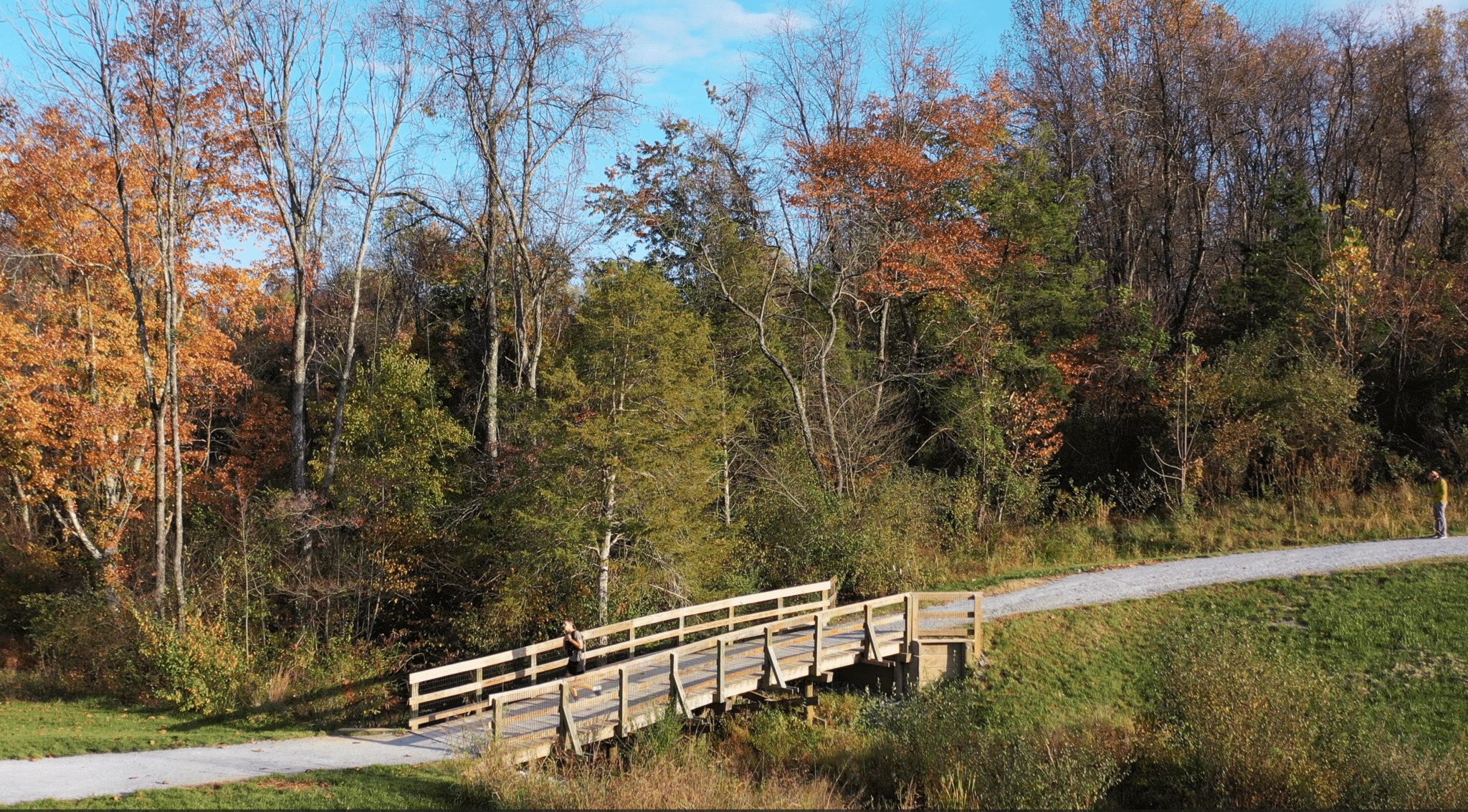
Community Impact & Long-Term Benefits
The bridges at Poplar Forest provide more than just physical connectivity; they strengthen the community, enhance access to amenities, and create a legacy of environmental stewardship. Some of the community impacts include:
Enhanced Access to Amenities
These bridges make it easier for residents and visitors to explore Poplar Forest, fostering a greater connection to the land and its historical significance.
Sustainable Infrastructure Legacy
By prioritizing sustainable methods, YBC’s work serves as a model for future infrastructure projects that aim to balance development with environmental preservation.
Long-Term Environmental Benefits
The ecological sensitivity displayed in the construction of these bridges contributes to the long-term health of the wetlands and surrounding areas, safeguarding these resources for future generations.
Through this project, YBC has made a lasting impact on both the Poplar Forest community and the field of sustainable infrastructure development.

